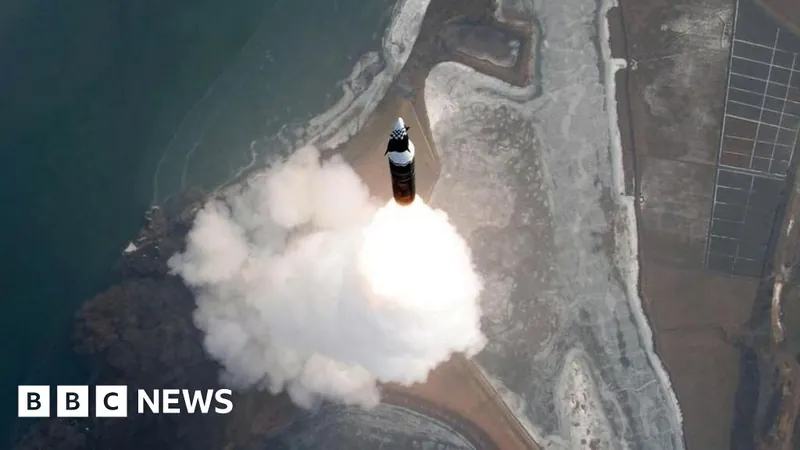
North Korea Unleashes Hypersonic Missile in Bold Show of Strength Amid US Talks
2025-01-07
Author: Ting
Introduction
In a dramatic display of military capability, North Korea has announced the successful launch of a new intermediate-range ballistic missile equipped with a hypersonic warhead, claiming it will "reliably contain any rivals in the Pacific region." This provocative action took place on Monday, coinciding with US Secretary of State Antony Blinken's diplomatic visit to Seoul, where he engaged with South Korean leadership amid rising tensions.
Details of the Missile Launch
North Korea asserts that this latest missile traveled at an astonishing speed of 12 times the speed of sound, covering a distance of approximately 1,500 kilometers before descending into the sea. However, South Korea's military reported the missile's total flight distance as 1,100 kilometers and condemned the launch as a "clear act of provocation."
Hypersonic Weapons Challenges
Hypersonic weapons, which travel at speeds exceeding five times the speed of sound, pose significant challenges for missile defense systems due to their agility and unpredictable trajectories. Experts suggest that while these technologies have existed for years, the recent advancements in hypersonic missile design have made them more evasive and capable of rapid re-entry into the atmosphere.
Advancements in Missile Technology
Analysts noted that the missile resembles an earlier model tested by North Korea last April, but Pyongyang claims that the new version incorporates an advanced "flight and guidance control system" and utilizes a carbon fiber composite engine intended to enhance performance and reliability. Ankit Panda, a nuclear weapons specialist at the Carnegie Endowment for International Peace, stated that the development of such weapons is not unexpected, given North Korea's ongoing research into missile technology.
Geopolitical Context
The timing of the launch is particularly significant given heightened geopolitical tensions. During his visit, Secretary Blinken pointed out concerns over potential collaborations between Russia and North Korea, specifically regarding the sharing of advanced space and satellite technologies. He warned that Moscow may consider recognizing North Korea as a legitimate nuclear power, a shift that could destabilize efforts aimed at denuclearizing the Korean peninsula.
Regional Responses and Military Cooperation
In response to the launch, South Korea has ramped up surveillance efforts, sharing intelligence on the missile with both the United States and Japan. The military cooperation between these nations has become crucial, especially as North Korea continues its missile testing amid internal political strife in South Korea, following the impeachment of President Yoon Suk Yeol.
Implications for Global Security
The implications of North's military advancements are alarming, not only for regional security but also on a global scale. With North Korea's history of aggressive rhetoric coupled with its increasing missile capabilities, the international community watches closely, aware that the tensions on the Korean Peninsula could have far-reaching consequences.
Conclusion
As this situation unfolds, experts urge vigilant monitoring and a united diplomatic front to address the escalating military threats posed by Pyongyang. The world is left wondering: just how far will North Korea go in its pursuit of military dominance?

 Brasil (PT)
Brasil (PT)
 Canada (EN)
Canada (EN)
 Chile (ES)
Chile (ES)
 Česko (CS)
Česko (CS)
 대한민국 (KO)
대한민국 (KO)
 España (ES)
España (ES)
 France (FR)
France (FR)
 Hong Kong (EN)
Hong Kong (EN)
 Italia (IT)
Italia (IT)
 日本 (JA)
日本 (JA)
 Magyarország (HU)
Magyarország (HU)
 Norge (NO)
Norge (NO)
 Polska (PL)
Polska (PL)
 Schweiz (DE)
Schweiz (DE)
 Singapore (EN)
Singapore (EN)
 Sverige (SV)
Sverige (SV)
 Suomi (FI)
Suomi (FI)
 Türkiye (TR)
Türkiye (TR)
 الإمارات العربية المتحدة (AR)
الإمارات العربية المتحدة (AR)